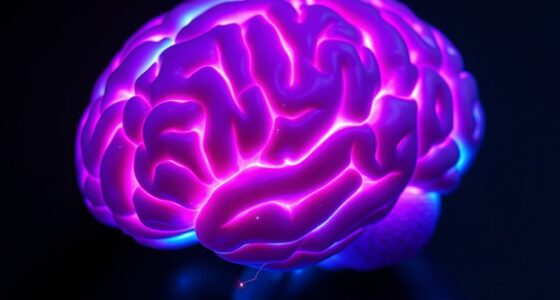When you do something morally good, your mind can justify later unethical actions, a tendency called moral licensing. This happens because positive acts boost your moral self-image, giving you a ‘credit’ to indulge in less ethical choices. You might think you’ve earned a break from your usual standards, leading to behavior that contradicts your values. Keep exploring to discover how understanding this bias can help you stay true to your principles.
Key Takeaways
- Doing good deeds can boost moral self-image, leading to justification for unethical behaviors later.
- Moral licensing creates a false sense of ‘moral credit’ that can be ‘spent’ on less ethical actions.
- Awareness of this bias helps prevent justifying bad choices after positive behaviors.
- People often unconsciously use their good deeds as a reason to indulge in unethical or selfish acts.
- Maintaining consistent values and self-awareness counters the tendency to justify bad choices after doing good.

Moral licensing occurs when people justify or feel justified in acting unethically after engaging in morally positive behavior. You might have experienced this yourself—after donating to a charity or volunteering your time, you might feel entitled to indulge in behaviors you’d normally avoid, like splurging on unnecessary purchases or neglecting your responsibilities. This phenomenon is part of an ethical paradox that reveals how our sense of moral self can sometimes backfire, leading us to make decisions that contradict our values. It’s a clear example of a behavioral bias, where your perception of moral goodness influences your subsequent choices, often in unintended ways.
This ethical paradox stems from the way your mind balances moral self-image and behavior. When you do something good, your brain registers a boost in moral worth, which can serve as a psychological reward. But instead of reinforcing consistent ethical behavior, this boost can create a false sense of moral ‘credit’ that you feel free to spend. You convince yourself that you’ve earned a break from your usual standards, which opens the door for less ethical actions. This bias can be subtle yet powerful, making it easier to justify behaviors that you’d typically consider wrong. The problem is that your moral self-regulation becomes skewed because you’re not consciously aware of how your positive actions influence your judgment.
Understanding this behavioral bias can help you recognize when you’re falling into the trap of moral licensing. You might think, “I’ve already done my good deed for the day,” and then unconsciously justify cutting corners or acting selfishly. The challenge lies in maintaining consistency, especially when your good deeds are motivated more by self-image than genuine altruism. When you’re aware of this tendency, you can pause and reflect on whether your actions truly align with your core values, rather than being driven by a desire to balance the moral ledger. Additionally, recognizing the role of Cookies in shaping online behavior can help you be more mindful of how your digital interactions influence your decision-making processes.
Recognize moral licensing to maintain consistency and ensure your actions reflect genuine values, not just moral balancing.
In everyday life, moral licensing can subtly shape your decisions—whether in the workplace, personal relationships, or social situations. For example, after making a socially responsible choice, you might feel justified in ignoring other ethical considerations. Recognizing this pattern allows you to challenge these impulses and aim for integrity, regardless of your recent actions. By understanding the ethical paradox and behavioral biases that fuel moral licensing, you can consciously avoid falling into the trap of justifying unethical choices, ultimately fostering a more consistent and authentic moral compass.
Frequently Asked Questions
How Can Individuals Recognize Their Own Moral Licensing Tendencies?
To recognize your own tendencies, you need to develop self-awareness and engage in reflective practices. Pay attention to moments when you justify easier or less ethical choices after doing something good. Ask yourself if you’re rewarding yourself or feeling entitled. Regularly pause and reflect on your motivations, so you can identify patterns of moral licensing. This awareness helps you make conscious decisions, maintaining integrity even after acts of kindness.
Are There Specific Environments Where Moral Licensing Is More Common?
You might notice that moral licensing is more common in environments where peer influence and social norms shape behavior. For example, in workplaces or social groups, when doing good is encouraged or celebrated, you may feel justified in making less ethical choices afterward. Coincidences happen often in these settings, making it easier to overlook the impact of your actions. Recognizing how social norms influence you helps prevent moral licensing from taking hold.
What Psychological Factors Influence Moral Licensing Behavior?
You might notice that psychological factors like self-control fatigue and your moral self-image influence your behavior. When you’re exhausted mentally, your self-control weakens, making it easier to justify bad choices after doing good. Additionally, maintaining a positive moral self-image can lead you to feel licensed to indulge or act less ethically, as you believe your good deeds offset potential missteps. These factors increase the likelihood of moral licensing behavior.
Can Moral Licensing Be Prevented or Minimized?
Think of moral licensing as a slippery slope you can’t see coming. To prevent or minimize it, you can practice self-awareness training to recognize when you’re justifying bad behavior. Building accountability partnerships helps keep you honest, like a safety net beneath the cliff. By staying mindful and connected, you break the cycle before it starts, ensuring your good deeds truly lead to positive change without unintended setbacks.
How Does Moral Licensing Affect Long-Term Ethical Consistency?
You might notice that moral licensing affects long-term ethical consistency by causing ethical inconsistency over time. When you do good, you may feel justified to make less ethical decisions afterward, leading to moral fatigue. This cycle can weaken your moral resolve, making it harder to maintain consistent ethical standards. Recognizing this pattern helps you stay mindful, so you can counteract moral fatigue and uphold your ethical commitments better.
Conclusion
So, next time you do something good, remember it might just give you a little license to slip up later. Coincidentally, that leftover cookie or a quick bad decision could be your mind’s way of balancing the scales. Stay aware of this tendency, and you’ll find it easier to stick to your better choices. After all, sometimes doing good is simply about recognizing when your actions and intentions align — no surprises needed.









